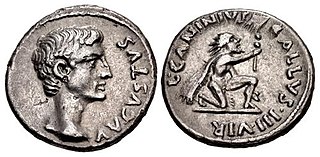Related Research Articles
Menippus of Stratonikeia, surnamed Catocas, was a Carian by birth, born in the city of Stratonicea. He was the most accomplished orator of his time in all Asia. Cicero, who heard him, puts him almost on a level with the Attic orators.
Titus Accius was a Roman jurist and knight.
Gnaeus Acerronius Proculus was a consul of the Roman Empire in 37 AD, with Gaius Petronius Pontius Nigrinus as his colleague; that was the year Tiberius died.
Manlius Acidinus was a young man of ancient Rome who was going to pursue his studies at Athens at the same time as a young Cicero, in 45 BC. He is perhaps the same Acidinus who sent intelligence to Cicero respecting the death of Marcellus.
Acrion was a Locrian and a Pythagorean philosopher. He is mentioned by Valerius Maximus under the name of Arion. According to William Smith, Arion is a false reading of Acrion.
Gaius Aculeo was a Roman knight who married the sister of Helvia, the mother of Cicero. He was unsurpassed in his day in his knowledge of the Roman law, and possessed great acuteness of mind, but was not distinguished for other attainments. He was a friend of Lucius Licinius Crassus, renowned as the greatest Roman orator of his day, and was defended by him upon one occasion. The son of Aculeo was Gaius Visellius Varro; from which it would appear that Aculeo was only a surname given to the father from his acuteness, and that his full name was Gaius Visellius Varro Aculeo.
Aeschines of Neapolis was an Academic philosopher who shared the leadership of the Academy at Athens together with Charmadas and Clitomachus about 110 BC, when Clitomachus was an old man. Diogenes Laërtius says that he was a pupil and favourite of Melanthius of Rhodes.
Alabandus was in Greek mythology a Carian hero, son of Euippus and Callirhoe, although which one is unclear.
Spurius Postumius Albinus Magnus was a politician of ancient Rome, of patrician rank, of the 2nd century BC. He was consul in 148 BC, in which year a great fire happened at Rome. It is this Spurius Albinus of whom Cicero speaks in the Brutus, and says that there were many orations of his.
Aulus Allienus was the name of two ancient Romans who lived roughly around the 1st century BC, and who may have been the same person:
Almo was in ancient Roman religion the eponymous god of the small river Almo in the vicinity of Rome. Like Tiberinus and others, he was prayed to by the augurs of Rome. In the water of Almo the aniconic stone embodying the mother of the gods, Cybele, used to be washed. He had a naiad daughter named Larunda.
The gens Auria was a Roman family at Larinum in southern Italy, known chiefly from Cicero's oration, Pro Cluentio.

The gens Caninia was a plebeian family at ancient Rome during the later Republic. The first member of the gens who obtained any of the curule offices was Gaius Caninius Rebilus, praetor in 171 BC; but the first Caninius who was consul was his namesake, Gaius Caninius Rebilus, in 45 BC.

The gens Sestia was a family at ancient Rome. The gens was originally patrician, but in later times there were also plebeian members. The only member of the family to obtain the consulship under the Republic was Publius Sestius Capitolinus Vaticanus, in 452 BC.
The gens Sextilia was a plebeian family at ancient Rome. The first member of this gens to achieve prominence was Gaius Sextilius, consular tribune in 379 BC. None of the family obtained the consulship, but they endured throughout Roman history from the early Republic into imperial times.
The gens Catiena was a Roman family during the late Republic. It is known chiefly from a single individual, Titus Catienus. Cicero describes him as an eques of low and mean character, who was angry with his brother, Quintus Tullius Cicero.
The gens Cicereia was a Roman family during the time of the Republic. It is known primarily from a single individual, Gaius Cicereius, the scriba, or secretary, of Scipio Africanus, who was elected praetor in 173 B.C. He obtained the province of Sardinia, but was ordered by the senate to conduct the war in Corsica. After defeating the Corsicans, Cicereius was denied his request for a triumph, and celebrated one on the Alban mount at his own expense. He was appointed an ambassador to Gentius, king of the Illyrians in 172 and 167.
The gens Cincia was a plebeian family at Rome. The first member of the gens to achieve prominence was Lucius Cincius Alimentus, who was elected praetor in 209 BC.
The gens Cispia was a plebeian family at Rome. Although the gens was supposedly of great antiquity, the Cispii only achieved prominence toward the end of the Republic.

The gens Cupiennia was a plebeian family at Rome. Members of this gens are first mentioned toward the end of the Republic. None of them achieved any great importance.
References
- ↑ Cicero, Ad Atticus vii. 2, xiii. 25, xv. 1. d 2
- ↑ Greenhill, William Alexander (1867). "Alexion". In William Smith (ed.). Dictionary of Greek and Roman Biography and Mythology . 1. Boston: Little, Brown and Company. p. 128.

| This Ancient Greek biographical article is a stub. You can help Wikipedia by expanding it. |